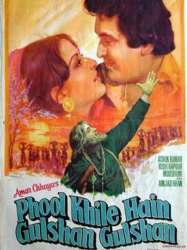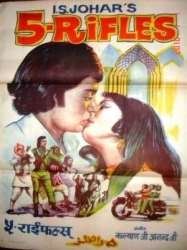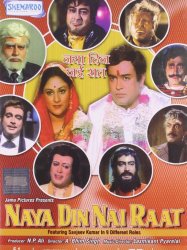Rajendra Krishan is a Scriptwriter and Sound Indian born on 6 june 1919 at Shimla (Inde)

Rajendra Krishan (June 6, 1919 Jalalpur Jattan - Mumbai -1988), also credited as Rajinder Krishan, was an Indian poet, lyricist and screenwriter.
In the mid-1940s, Krishan shifted to Mumbai to become a screenwriter. His first screenplay was Janta (1947). His first film as a lyricist was Zanjeer (1947). He was first noted for the script and lyrics of the Motilal-Suraiya starrer Aaj Ki Rat (1948). After the assassination of Mahatma Gandhi, Krishan wrote a song Suno Suno Aye Duniyawalon, Bapu Ki Yeh Amar Kahani. The song was sung by Mohammed Rafi and composed by Husnlal Bhagatram, and was a great hit. He also tasted success as a lyricist with the films Badi Bahen (1949) and Lahore (1949).
Rajendra Krishan knew Tamil language and wrote 18 scripts for AVM Studios films. Rajendra Krishna is known for his association with the composer C. Ramchandra. He worked with several other music directors including Shankar-Jaikishan, Madan Mohan, Hemant Kumar, Sajjad Hussain, Sachin Dev Burman, Rahul Dev Burman, S Mohinder, Chitragupta, Salil Chowdhury, and Laxmikant-Pyarelal.
After his death, HMV brought out an LP containing 12 of his songs.
Source : Wikidata
Rajendra Krishan

- Infos
- Photos
- Best films
- Family
- Characters
- Awards
Nationality Inde
Birth 6 june 1919 at Shimla (Inde)
Death 23 september 1987 (at 68 years) at Mumbai (Inde)
Awards Filmfare Awards
Birth 6 june 1919 at Shimla (Inde)
Death 23 september 1987 (at 68 years) at Mumbai (Inde)
Awards Filmfare Awards
Biography
Rajendra Krishan was born on June 6, 1919 in a Duggal family of Jalalpur Jattan of Gujrat District (in present day Pakistan). Even when he was studying in the eighth class he was attracted towards poetry. In his early work life he had a clerk's job in the municipal office in Simla, where he toiled up to 1942. During that period, he read eastern and western authors extensively and wrote poetry. He expresses his indebtedness to the Urdu poetry of Firaq Gorakhpuri and Ahsan Danish, as well as to the Hindi poems of Pant and Nirala.In those days the newspapers in the Delhi-Punjab brought out special supplements and held poetry contests to mark Krishna Janmashtami, in which he participated regularly.He was attracted towards poetry during his school days.In the mid-1940s, Krishan shifted to Mumbai to become a screenwriter. His first screenplay was Janta (1947). His first film as a lyricist was Zanjeer (1947). He was first noted for the script and lyrics of the Motilal-Suraiya starrer Aaj Ki Rat (1948). After the assassination of Mahatma Gandhi, Krishan wrote a song Suno Suno Aye Duniyawalon, Bapu Ki Yeh Amar Kahani. The song was sung by Mohammed Rafi and composed by Husnlal Bhagatram, and was a great hit. He also tasted success as a lyricist with the films Badi Bahen (1949) and Lahore (1949).
Rajendra Krishan knew Tamil language and wrote 18 scripts for AVM Studios films. Rajendra Krishna is known for his association with the composer C. Ramchandra. He worked with several other music directors including Shankar-Jaikishan, Madan Mohan, Hemant Kumar, Sajjad Hussain, Sachin Dev Burman, Rahul Dev Burman, S Mohinder, Chitragupta, Salil Chowdhury, and Laxmikant-Pyarelal.
After his death, HMV brought out an LP containing 12 of his songs.
Usually with
Filmography of Rajendra Krishan (47 films)
Scriptwriter

Angaaray (1986)
Genres Adventure, Crime, Romance
Actors Rajesh Khanna, Smita Patil, Raj Babbar, Shakti Kapoor, Iftekhar, Bindu
Roles Lyricist
Rating59%





Aarthi (Smita Patil) is an educated girl living with her young brother Sanjay Verma (Alankar Joshi) and her mother. She joins as the personal secretary to Jolly (Shakti Kapoor). Meanwhile Vijay (Raj Babbar) develops a desire that he should marry Aarthi, although he does not propose to her directly. One day Vijay finds that Aarthi's brother is a drug addict and promptly informs Aarthi. She convinces her brother to join the army so that he becomes a disciplined person in his life. After a few days Jolly tries to rape Aarthi and Vijay comes to the rescue.

Khel Mohabbat Ka (1986)
Actors Farooq Sheikh, Poonam Dhillon, Shakti Kapoor, Saroj Khan, Madan Puri, Prema Narayan

Genres Romance
Actors Rishi Kapoor, Moushumi Chatterjee, Mithun Chakraborty, Ashok Kumar, Mukri, Asrani
Rating60%






Charandas (1977)
Genres Drama
Actors Dharmendra, Amitabh Bachchan, Sunil Dutt, Urmila Bhatt, Manorama, Aachi Manorama
Roles Lyricist
Rating60%





The entire plot is woven around Indian family values, entrepreneurship and meteoric rise in business of a workshop owning mechanic, Charandas, played by veteran actor Om Prakash. Charandas lives with his dutiful, religious wife Kamla, enacted by Urmila Bhatt, and two children, running a mechanic workshop. He has a good family friend Aslam played by Raj Mehra. His bank loan is sanctioned and in a time span of 10 years, he builds an engineering empire, becoming a rich tycoon. All through he shares family get togethers with his friends and their families and it is here, that Dharmendra and Amitabh Bachchan, make a special appearance in a famous Qawwali, "Han Dekh Lo Ishq Ka Martava", sung by Aziz Nazan Qawwal, Yesudas, on Aslam's birthday.

Ponga Pandit (1975)
Directed by Prayag Raj
Genres Drama, Comedy, Action
Actors Randhir Kapoor, Danny Denzongpa, Prema Narayan, Nirupa Roy, Madan Puri, Dr. Shriram Lagoo
Rating64%





Haridwar-based Neelkanth Pandey and Shambhu Nath get their children, Bhagwantiprasad and Parvati respectively, married. While Shambhu re-locates to live in Bombay, Neelkanth continues to reside in the same residence. Years later both children have grown up, so Neelkanth invites the Naths to finalize the nuptials. Very soon the Pandeys will face humiliation and ridicule at the hands of Parvati, who now calls herself Pamela, and Shambhu, who wants his daughter to marry someone sophisticated and wealthy, while Parvati is in love with a singer named Rocky. Bhagwanti is determined to fulfill his parents' wishes and decides to stay wed to Parvati, re-locates to Bombay, to try and woo her back - with results that will end up changing his life forever

5 Rifles (1974)
Directed by I. S. Johar
Genres Comedy, Action
Actors Rajesh Khanna, Shashi Kapoor, I. S. Johar, Kamal Kapoor, Sapru
Roles Lyricist
Rating67%






Naya Din Nai Raat (1974)
Directed by A. Bhimsingh
Genres Drama
Actors Sanjeev Kumar, Jaya Bachchan, David Abraham, Tun tun (Uma Devi Khatri), Sundar, Manorama
Rating70%






Jwar Bhata (1973)
Directed by Adurthi Subba Rao
Actors Dharmendra, Saira Banu, Sujit Dhungana, Gulshan Bawra, Nazir Hussain, Jeevan
Rating66%





Widowed and wealthy Durgadas Prasad(Nazir Hussain) is the sole owner of Shriman Mills. He has one son, who falls in love with a woman from a poor family. This disappoints Durgadas and he asks his son to leave. His son leaves, gets married, and soon has a son. Unfortunately, Durgadas's son does not live for long, leaving his wife and son destitute. Durgadas has a change of heart and goes around looking for his son and his family, but in vain. Years later Durgadas is much more older and not expected to live long. He recruits a Secretary, Gayetri, who looks after him. Then when his relatives insist that he adopt his distant nephew, Anokhey, he agrees, only to have Gayetri bring home a young man, Billoo, who operates a simple Dal Roti restaurant. Durgadas is jubilant when he verifies that Billoo is indeed his grandson and throws a grand party. After the party, Durgadas(Nazir Hussain) passes away, leaving everything in Billoo's hands. Billoo changes his name to Balraj and starts to look after his grandfather's business. Durgadas's relatives, Iqbal Nath, his daughter, Rekha; a cousin, Satwani, and her son, Anokhey; along with Advocate Ramesh Khanna, conspire with each other and concoct of plan - a plan so devious that will not only entrap Billoo and Gayetri in it - but also make them loathe the day they met Durgadas.

Bombay to Goa (1972)
Directed by Mehmood Ali
Genres Drama, Comedy, Action, Adventure, Romance
Themes Transport films, Road movies
Actors Amitabh Bachchan, Mehmood Ali, Aruna Irani, Shatrughan Sinha, Anwar Ali, Aachi Manorama
Roles Dialogue
Rating66%






Maalik (1972)
Directed by A. Bhimsingh
Actors Rajesh Khanna, Sharmila Tagore, Ashok Kumar, Deven Varma, Bipin Gupta, Sonia Sahni
Rating65%






Shehzada (1972)
Actors Rajesh Khanna, Rakhee Gulzar, Pandari Bai, Sundar, Mohan Choti, Madan Puri
Rating71%






Jwala (1971)
Genres Action
Actors Sunil Dutt, Madhubala, Sohrab Merwanji Modi, Pran Krishan Sikand, Goga Kapoor, David Abraham
Roles Lyricist
Rating45%






Man Mandir (1971)
Actors Sanjeev Kumar, Waheeda Rehman, Rakesh Roshan, David Abraham, Mehmood Ali, Aruna Irani
Rating54%






Gopi (1970)
Directed by A. Bhimsingh
Actors Dilip Kumar, Saira Banu, Aruna Irani, Pran Krishan Sikand, Durga Khote, Johnny Walker
Rating69%






Saas Bhi Kabhi Bahu Thi (1970)
Actors Sanjay Khan, Leena Chandavarkar, Om Prakash, Shashikala, Lalita Pawar, Syed Ishtiaq Ahmed Jaffery
Rating64%





 Connection
Connection

